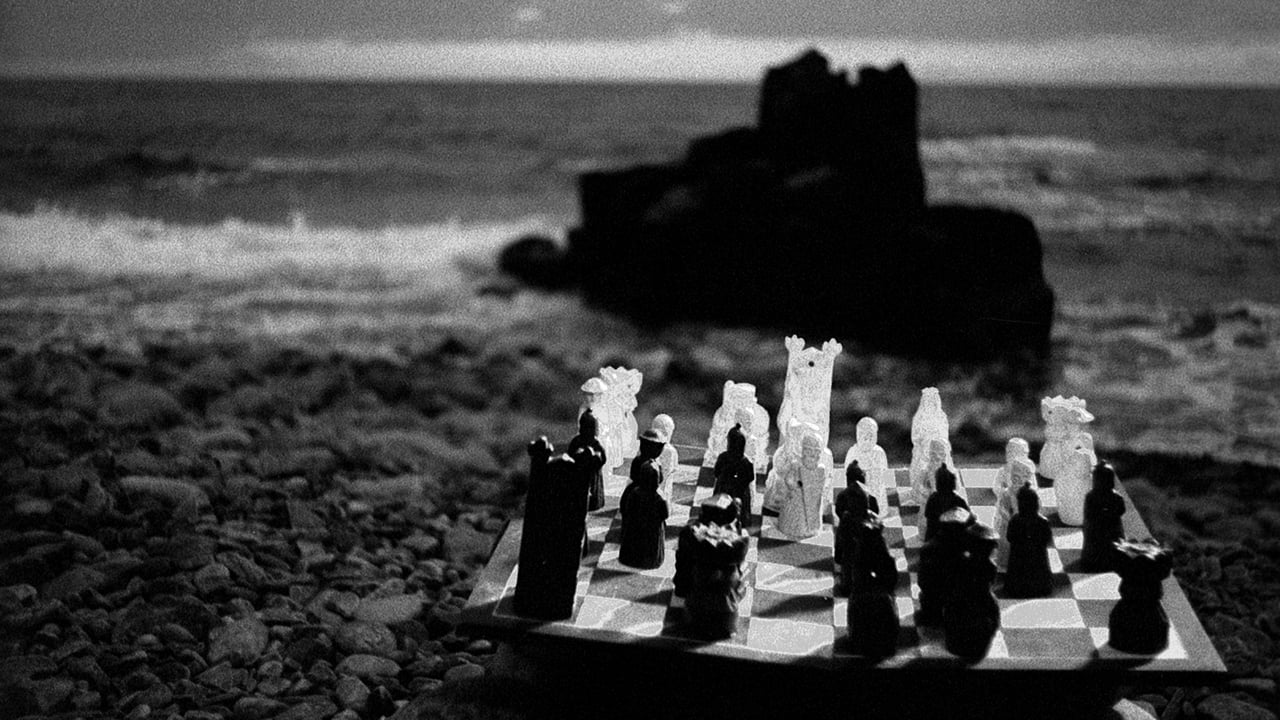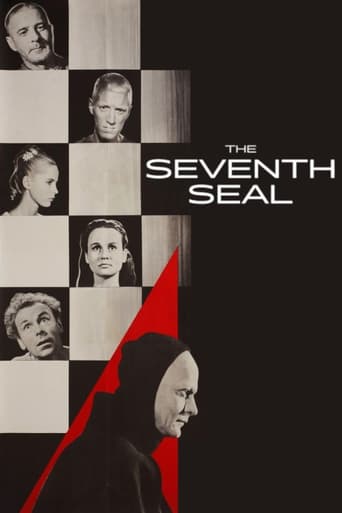Osmosis Iron
This is the film that made me truly appreciate movies and made me into the "cinemaniac" I am today! It is absolutely breathtaking, from it's fantastic B&W visuals, where just a still shot or a clever transition can tell tales by itself. It has many brilliant moments throughout that have entered into pop culture and are iconic and known to even those who have not seen the movie. There are no weak performances here, but the standouts are von Sydow as the wandering Knight and Enkerot as the most memorable Grim Reaper from the silver screen! The metaphysical, religious and existential themes are handled intellectually and entertainingly, while not spoon feeding viewer the "answers". An absolute timeless Masterpiece!
Jake Calta
Ingmar Bergman is a director of unparalleled brilliance. Since his first script, 1944's Torment, Bergman has always delivered thoughtful and engaging films that delve deep into humanity. Be it relations between one another, our consciousness and subconsciousness, or any number of various facets of our existence, Bergman cuts to the very core of humanity and bring to light these many layers and elements in exceedingly artful ways. And one of the great tales told by the Swedish titan that demonstrates this well is his cherished and revered classic, The Seventh Seal.The Seventh Seal is a masterful piece of filmmaking that explores man's relationship with religion in medieval times, a time when the Church had a stranglehold on feudal Europe. The story of disillusioned knight Antonius Block, played by the impeccable Max von Sydow, returning from the grueling Crusades to lands ravaged by the Great Plague and taking on Death itself, portrayed by the chilling Bengt Ekerot, in a chess match for his life is one of the most simple yet complex tales captured on celluloid. Alongside this central battle is a colorful cast of side characters, including he blissful pair of actors Jof & Mia, played by Nils Poppe & Bibi Andersson respectively, and Block's squire Jöns, brought to life with delightfully dry wit by Gunnar Björnstrand, who flesh out the dark world of medieval Sweden and provide levity and even humor in the midst of the grim conflict and existential inquires made by Block.Bergman's script, adapted from a play of his titled Wood Painting, is somewhat on the nose in its mulling over of faith, death, and existence. But to a degree, what Bergman crafted was an adult fairy tale. The Seventh Seal is a story you could tell a child as it is simple in its narrative and its developments, but is rich in imagery and allusion, taking its title from and quoting at the outset from the eighth chapter of the Book of Revelations. Block's passionate search for knowledge and constant crisis of faith is engaging on a philosophical and personal level, aided by the impassioned performance provided by Sydow. The premise is a simple piece of high fantasy, but it delves into it themes openly and in depth. British author Melvyn Bragg put it best when he described the film as having an argumentative structure and being "told as a sermon might be delivered: an allegory." Adding to these inquiries and the sharp discussions between Block and Death in the midst of their match are characters such as Jof & Mia that bring a certain level of hope to the piece, as both are pleasant and optimistic for a fair portion of the film, with Jof being almost prophetic in a way, being able to see visions of both Mary and a young Jesus, and ominous premonitions of the effects of the Great Plague. And then there is the squire Jöns, an unadulterated cynic who, as described by American author and film historian Gerald Mast in his book A Short History of the Movies, "treats death as a bitter and hopeless joke." These supporting roles help to build the world and the themes of death and faith through their interactions with Block. All in all, the script, in spite of its bluntness, is exceptionally articulate and works wonders with its straightforward but fantastic premise.On the technical side, The Seventh Seal is a low-budget marvel, knowing that it was made on a pauper's budget of $150,000. Bergman's direction is inspired in its bleak tone that pairs well with the equally dark concepts presented in the script. He approaches the film rather intellectually, showing chilling images of an ill woman writhing in pain being looked over by a monk, and depicting Death as incredibly callous in a famous scene involving the felling of a tree. Every actor and actress is clearly invested. Sydow, Ekerot, Björnstrand, Andersson, throw a dart, and the name you hit is giving his or her all in the role. The chemistry between the characters is spectacular, with Sydow and Ekerot boasting one of the most impressive dichotomies in committed to celluloid. Gunnar Fischer's expressionistic cinematography was universally lauded upon release, and rightfully so. The gothic and pastoral medieval imagery is elegantly captured with impressive lighting schemes and excellent framing, with the introduction of Death and the "Danse Macabre" being the two iconic shots that bookend the film. P.A. Lundgren's production design and Manne Lindholm's costume design go hand in hand in creating the lived-in world of medieval Sweden, with big props going to Lindholm in draping Death with the iconic black cloak. Also of note is the inspired score by regular collaborator Erik Nordgren, whose liberal use of the Latin chant Dies Irae, general implementation of choral passages, and orchestral mannerisms reminiscent of celebrated American composer Bernard Herrmann enrich the film through heightening the grimness and further enveloping the audience in the atmosphere of the period.At the end of the day, The Seventh Seal is deservedly a classic. It is a film that blatantly ponders the nature of faith and death, but does so in an engaging and personal way. Through a combination of Bergman's well-crafted characters and each actor's pitch-perfect execution, you become invested in all facets of this world. You are there with Block in taking on Death, and you too want to know the answers, you want the knowledge he seeks, you too want "God to stretch out His hand." The production values are top notch, especially knowing that the budget afforded to Bergman was so small. But at the end of the day, it is a film that has to be seen to truly appreciate. So in closing, go and watch this film. If you consider yourself a fan of cinema, or are an aspiring filmmaker, simply take some time to watch this masterclass of medieval fantasy and world cinema.
elvircorhodzic
THE SEVENTH SEAL is a film that presents a dramatic fantasy game between meaning of life and fear of death. A knight and his squire have returned to their country after a ten-year crusade. Deadly disease ravaged country. Knight faces Death. He calls Death on the multi-day game of chess...The story has touched serious philosophical and religious topics. However, the story is full of intrigue, dark humor and hope. The protagonists are distracted between the vicious disease, self-pity and torture. It is interesting to see a deeply disillusioned knight, a cynical squire who hates women, a cheating wife, evil priests, a mute girl and seemingly healthy and happy family on the same road. The truth is all around them. The main protagonist used to persistently ask questions to which only he has a valid response. This film reveals some controversial issues. Is deadly disease greater threat to man or the man is the greatest enemy to himself? Mr. Bergman has painted realistic effects of fear, horror, cynicism, surprises, love and health on human faces.Max von Sydow as Antonius Block, the knight is a more serious version of Don Quixote. Gunnar Björnstrand Jöns, the squire is a character who never changes his mood. He always has some sort of cynical jokes or words of contempt for each occurrence. Bengt Ekerot is Death in the true sense of that word. Nils Poppe as Jof is a juggler who has strange predictions. Fortunately, no one believes him. Bibi Andersson as Mia, Jof's wife is a beautiful and cheerful woman who does not fit into the landscape.Life is a hard journey. The rare moments of happiness are a sort of salvation. The end of the film emphasizes the transience of life and the power of death which no one can escape. Of course, only in the eyes of one of the protagonists.
classicsoncall
On the Criterion Collection interview with Ingmar Bergman, he relates that he wrote the chess scene over his own fear of dying. This would have been an immensely interesting idea to explore, but after he mentions it, the interview is practically over. That left me rather frustrated.The film itself may also leave one rather frustrated, as it explores the principal character agonizing over God's unwillingness to show His face and answer his existential questions about the meaning of life and the certainty of death. When Death (Bengt Ekerot) makes his entrance to claim him a victim, Antonius Block (Max von Sydow) challenges the Grim Reaper to a game of chess, the winner to exact his own reward. The Knight must quickly readjust his game plan after he unwittingly reveals his strategy to the black clad harvester of souls.The film is set during the time of the Black Plague, following a 'worthless' crusade of ten years that the Knight and his Squire Jons (Gunnar Bjornstrand) participated in. All around them are wanderers half crazed with fear at the thought of the Plague approaching. All the time Death appropriates his victims, he claims to know nothing and hold no secrets. Fearing his own demise, Block (Bergman?) disrupts the chess board, intent on prolonging his existence in a world full of uncertainty."The Seventh Seal" is Bergman's stunning allegory of man's search for meaning, but what I've come to understand after many years is that each person must come to terms with himself from within. Attempting to extract answers from a single source is bound to end in disappointment, trapped if you will in a Knight's world of phantoms and dreams more like nightmares. This is the kind of film that presents more questions than answers, as I'm sure Bergman understood and intended.

